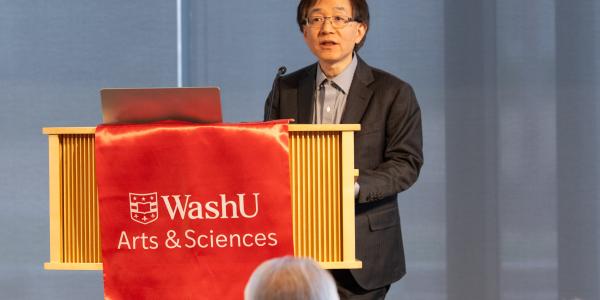Andrew Butler, associate professor of education and of psychological and brain sciences, studies the malleability of memory. His program of research addresses both theoretical issues in cognitive psychology and practical applications to education and mental health. He sat down with the Ampersand as part of our series featuring faculty that joined Arts & Sciences this academic year.

After earning your doctorate in psychology here at WashU, what are some of the things that motivated you to return to campus as a faculty member?
The psychology department itself is a big family. People get along really well, and they work well together. And that’s a microcosm of the larger WashU environment, in my experience. As a student, I was very active in student government, so I knew a lot about the rest of the university. I’ve been at other universities since getting my PhD – and they were wonderful places, too – but what I saw helped me appreciate the unique culture of WashU. For example, how some of the other institutions have ‘individual excellence’ kind of models. Everyone has their own fiefdom and resources, and they don’t want to play with other people. I can do work in that kind of a model, but I really prefer an environment where everyone works together. I really feel that that’s the way that science is increasingly going, and I think that it's an important thing. The culture at WashU was a big part of the draw to come back.
Beyond that, I was happy to have the opportunity to be in a place where people value the connection between psychology and education. You’ve got a lot of folks here who are interested in facilitating those connections. For example, many of the faculty and students in education and psychological and brain sciences. In addition, there are people like Mark McDaniel and Gina Frey, who lead the CIRCLE center and are doing a lot of work trying to improve learning in undergraduate courses here at WashU. You’ve got other folks that are doing outreach, like the Institute for School Partnership. There are so many exciting and innovative things going on.
Did you have a favorite spot on campus as a student, and is it still your favorite spot?
I used to love going to Holmes Lounge. When I was in grad school, there were free newspapers for students every day, and I’d just sit by the fire and read or work. I just loved that room. The history of the room is really amazing, and it’s beautiful. I don’t go there as much since I’ve been back. Usually I’m here in Seigle or over in psychology – there are a lot more places I need to be now. But I’d like to get back to doing that.
Your lab here is called the Memory Dynamics Laboratory. What are some of the main questions that you tackle?
I’m interested in lots of things, probably too many. Fundamentally, I’m interested in memory and the processes and mechanisms that lead memory to change or remain stable over time. Often the way that we think about learning is that it is mostly determined by what happens at the start, when you first encounter new experiences or new information. And that is a big part of it. However, a lot of the process of learning, and a lot of what shapes what you know and what you remember, is what happens afterward – how you retrieve and work with memories over time. I’m interested in that larger process and the dynamics of how it unfolds over time.
With respect to applications, like in education, I’m interested in how you might facilitate changes in a positive direction. For example, if you wanted to help students acquire a deeper understanding of some sort of material, how would you go about doing that? We can take some basic principles from the science of learning and apply them in a classroom to achieve that goal. It is using and implementing the science in different contexts that drives a lot of what I’m interested in.
What are some of the puzzles or challenges in this area of research that have caught your attention recently?
Some of the puzzles that have come up recently are really about how to facilitate behavioral change. We know a lot about how to help people learn more effectively and efficiently. The problem is that you can give people knowledge, but that’s not a sufficient condition for behavioral change. We know a lot of things that we don’t put into practice, for various reasons – because they’re hard, or because we don’t think they’re right for us, or all kinds of other reasons. So one of the puzzles that I’ve been trying to solve recently is, how do you motivate people to engage in some of these behaviors that would be really good for them? Students are doing lots of wonderful things, and teachers are doing wonderful things. That’s a great starting point. But people could be learning and teaching more efficiently or effectively.
This puzzle has led me to become interested in the research on motivation and socio-emotional learning. A lot of the principles and strategies that are really effective for helping people to learn create challenging situations for people. And when tasks or activities get difficult, people don’t always want to engage with them. I’m working to find out how can you help people reinterpret that difficulty as being something that’s productive for learning, so that they want to engage with it.
Do you remember when you first became interested in studying memory, and has your interest always overlapped with ideas about education?
I think I’ve always been interested in questions about memory. It definitely started in earnest in college. I started as an econ major because I thought I wanted to be a businessman, but also was taking philosophy courses and was really interested in the questions being asked in those classes. Then I started taking psychology classes, and it felt like I was able to ask similar questions but in ways that enabled me to try to answer them. I really fell in love with psychology, then took a human memory and learning course and fell in love with that topic in particular. One of the things I like about memory is that it touches everything that we do. Pretty much anything that you’re interested in, memory is fundamental to it.




